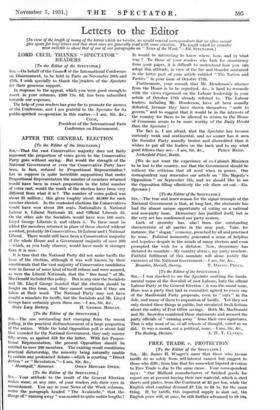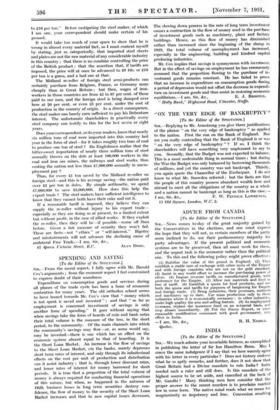FREE TRADE v. PROTECTION
[To the Editor of the SPECTATOR.] STR,—Mr. James II. Weager's sneer that those who favour tariffs do so solely from self-interest cannot but suggest to those who differ from him that his somewhat bigoted devotion to Free Trade is due to the same cause. Your correspondent says : " Our Midland manufacturers of finished goods for export are at present buying their raw material, which is steel sheets and plates, from the Continent at £5 per ton, while the English steel combine demand £7 15s. to £8 5s. for the same thing. If, by tariffs, this imported supply is shut out, the English price will, at once, be still further advanced to £910s, to £10 per ton." Before castigating the steel maker, of which I am one, your correspondent should make certain of his ground.
It would take too much of your space to show that he is wrong in almost every material fact, so I must content myself by stating, just as categorically, that imported steel sheets and plates are not the raw material of any considerable industry in this country ; that there is no combine controlling the price of the British product ; that the assertion that, if tariffs are imposed, the price will at once be advanced to £9 10s: or £10 per ton is a guess, and a bad one at that.
The Midland re-roller of foreign steel semi-products can certainly purchase from Belgium, France, or Germany more cheaply than in Great Britain ; but then, wages of iron- workers in those countries are from 45 to 67 per cent. of those paid to our men, and the foreign steel is being dumped over here at 20 per cent. or even 25 per cent. under the cost of prOduction in the country of origin. As a direct consequence, the steel maker can barely earn sufficient to pay his Debenture interest. The unfortunate shareholders in practically every steel company can testify to this for the last seven or eight years.
Does your correspondent, or do your readers, know that nearly six million tons of coal were imported into this country last year in the form of steel—for it takes roughly two tons of coal to produce one ton of steel ? Do Englishmen realize that the bitter-sweet importation of nearly three million tons of steel annually throws on the dole at least 100,000 workers in the coal and iron ore mines, the railways and steel works, thus costing the nation not less than £7,000,000 annually in unem- ployment pay ?
Thus, for every £1 ton saved by the Midland re-roller on foreign steel—and this is his average saving—the nation paid over £2 per ton in doles. By simple arithmetic, we spend £7,000,000 to save £3,000,000. How does this help the export trade ? The steel makers have sufficient intelligence to know that they cannot both have their cake and eat it.
If a reasonable tariff is imposed, they believe they can supply the re-roller without injury to his export trade—
especially as they are doing so at present, to a limited extent but without profit, in the case of allied works. If they exploit the re-roller, then they will be—if possible—worse off than before. Given a fair measure of security they won't fail. These are facts—not " ethics " or " self-interest." Bigotry and misstatements will not advance the declining cause of unilateral Free Trade.—I am, Sir, &c.,
67 Queen Victoria Street, E.C. ALAN DORE.















































 Previous page
Previous page